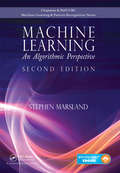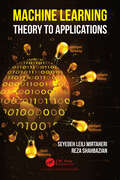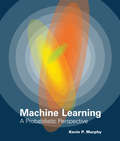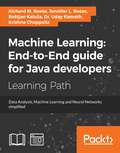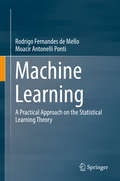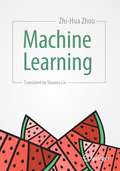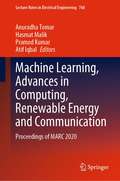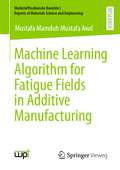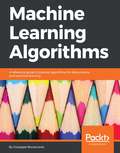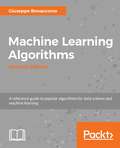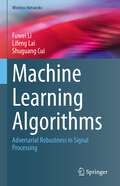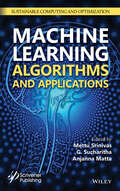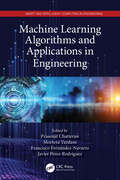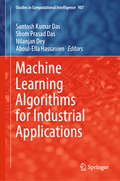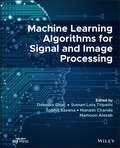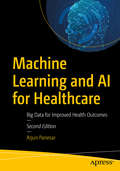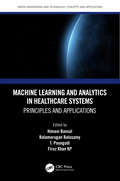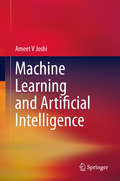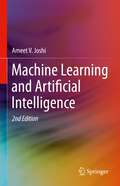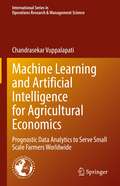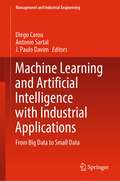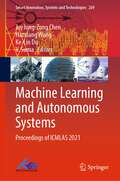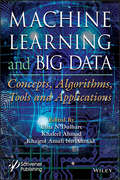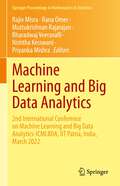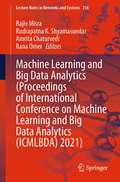- Table View
- List View
Machine Learning: An Algorithmic Perspective, Second Edition
by Stephen MarslandA Proven, Hands-On Approach for Students without a Strong Statistical FoundationSince the best-selling first edition was published, there have been several prominent developments in the field of machine learning, including the increasing work on the statistical interpretations of machine learning algorithms. Unfortunately, computer science students
Machine Learning: Theory to Applications
by Seyedeh Leili Mirtaheri Reza ShahbazianThe book reviews core concepts of machine learning (ML) while focusing on modern applications. It is aimed at those who want to advance their understanding of ML by providing technical and practical insights. It does not use complicated mathematics to explain how to benefit from ML algorithms. Unlike the existing literature, this work provides the core concepts with emphasis on fresh ideas and real application scenarios. It starts with the basic concepts of ML and extends the concepts to the different deep learning algorithms. The book provides an introduction and main elements of evaluation tools with Python and walks you through the recent applications of ML in self-driving cars, cognitive decision making, communication networks, security, and signal processing. The concept of generative networks is also presented and focuses on GANs as a tool to improve the performance of existing algorithms. In summary, this book provides a comprehensive technological path from fundamental theories to the categorization of existing algorithms, covers state-of-the-art, practical evaluation tools and methods to empower you to use synthetic data to improve the performance of applications.
Machine Learning: A Probabilistic Perspective (Adaptive Computation and Machine Learning series)
by Kevin P. MurphyA comprehensive introduction to machine learning that uses probabilistic models and inference as a unifying approach.Today's Web-enabled deluge of electronic data calls for automated methods of data analysis. Machine learning provides these, developing methods that can automatically detect patterns in data and then use the uncovered patterns to predict future data. This textbook offers a comprehensive and self-contained introduction to the field of machine learning, based on a unified, probabilistic approach.The coverage combines breadth and depth, offering necessary background material on such topics as probability, optimization, and linear algebra as well as discussion of recent developments in the field, including conditional random fields, L1 regularization, and deep learning. The book is written in an informal, accessible style, complete with pseudo-code for the most important algorithms. All topics are copiously illustrated with color images and worked examples drawn from such application domains as biology, text processing, computer vision, and robotics. Rather than providing a cookbook of different heuristic methods, the book stresses a principled model-based approach, often using the language of graphical models to specify models in a concise and intuitive way. Almost all the models described have been implemented in a MATLAB software package—PMTK (probabilistic modeling toolkit)—that is freely available online. The book is suitable for upper-level undergraduates with an introductory-level college math background and beginning graduate students.
Machine Learning: End-to-End guide for Java developers
by Richard M. Reese Jennifer L. Reese Bostjan Kaluza Dr Uday Kamath Krishna ChoppellaDevelop, Implement and Tuneup your Machine Learning applications using the power of Java programming About This Book • Detailed coverage on key machine learning topics with an emphasis on both theoretical and practical aspects • Address predictive modeling problems using the most popular machine learning Java libraries • A comprehensive course covering a wide spectrum of topics such as machine learning and natural language through practical use-cases Who This Book Is For This course is the right resource for anyone with some knowledge of Java programming who wants to get started with Data Science and Machine learning as quickly as possible. If you want to gain meaningful insights from big data and develop intelligent applications using Java, this course is also a must-have. What You Will Learn • Understand key data analysis techniques centered around machine learning • Implement Java APIs and various techniques such as classification, clustering, anomaly detection, and more • Master key Java machine learning libraries, their functionality, and various kinds of problems that can be addressed using each of them • Apply machine learning to real-world data for fraud detection, recommendation engines, text classification, and human activity recognition • Experiment with semi-supervised learning and stream-based data mining, building high-performing and real-time predictive models • Develop intelligent systems centered around various domains such as security, Internet of Things, social networking, and more In Detail Machine Learning is one of the core area of Artificial Intelligence where computers are trained to self-learn, grow, change, and develop on their own without being explicitly programmed. In this course, we cover how Java is employed to build powerful machine learning models to address the problems being faced in the world of Data Science. The course demonstrates complex data extraction and statistical analysis techniques supported by Java, applying various machine learning methods, exploring machine learning sub-domains, and exploring real-world use cases such as recommendation systems, fraud detection, natural language processing, and more, using Java programming. The course begins with an introduction to data science and basic data science tasks such as data collection, data cleaning, data analysis, and data visualization. The next section has a detailed overview of statistical techniques, covering machine learning, neural networks, and deep learning. The next couple of sections cover applying machine learning methods using Java to a variety of chores including classifying, predicting, forecasting, market basket analysis, clustering stream learning, active learning, semi-supervised learning, probabilistic graph modeling, text mining, and deep learning. The last section highlights real-world test cases such as performing activity recognition, developing image recognition, text classification, and anomaly detection. The course includes premium content from three of our most popular books: • Java for Data Science • Machine Learning in Java • Mastering Java Machine Learning On completion of this course, you will understand various machine learning techniques, different machine learning java algorithms you can use to gain data insights, building data models to analyze larger complex data sets, and incubating applications using Java and machine learning algorithms in the field of artificial intelligence. Style and approach This comprehensive course proceeds from being a tutorial to a practical guide, providing an introduction to machine learning and different machine learning techniques, exploring machine learning with Java libraries, and demonstrating real-world machine learning use cases using the Java platform.
Machine Learning: A Practical Approach on the Statistical Learning Theory
by Rodrigo Fernandes de Mello Moacir Antonelli PontiThis book presents the Statistical Learning Theory in a detailed and easy to understand way, by using practical examples, algorithms and source codes. It can be used as a textbook in graduation or undergraduation courses, for self-learners, or as reference with respect to the main theoretical concepts of Machine Learning. Fundamental concepts of Linear Algebra and Optimization applied to Machine Learning are provided, as well as source codes in R, making the book as self-contained as possible.It starts with an introduction to Machine Learning concepts and algorithms such as the Perceptron, Multilayer Perceptron and the Distance-Weighted Nearest Neighbors with examples, in order to provide the necessary foundation so the reader is able to understand the Bias-Variance Dilemma, which is the central point of the Statistical Learning Theory.Afterwards, we introduce all assumptions and formalize the Statistical Learning Theory, allowing the practical study of different classification algorithms. Then, we proceed with concentration inequalities until arriving to the Generalization and the Large-Margin bounds, providing the main motivations for the Support Vector Machines. From that, we introduce all necessary optimization concepts related to the implementation of Support Vector Machines. To provide a next stage of development, the book finishes with a discussion on SVM kernels as a way and motivation to study data spaces and improve classification results.
Machine Learning
by Zhi-Hua ZhouMachine Learning, a vital and core area of artificial intelligence (AI), is propelling the AI field ever further and making it one of the most compelling areas of computer science research. This textbook offers a comprehensive and unbiased introduction to almost all aspects of machine learning, from the fundamentals to advanced topics. It consists of 16 chapters divided into three parts: Part 1 (Chapters 1-3) introduces the fundamentals of machine learning, including terminology, basic principles, evaluation, and linear models; Part 2 (Chapters 4-10) presents classic and commonly used machine learning methods, such as decision trees, neural networks, support vector machines, Bayesian classifiers, ensemble methods, clustering, dimension reduction and metric learning; Part 3 (Chapters 11-16) introduces some advanced topics, covering feature selection and sparse learning, computational learning theory, semi-supervised learning, probabilistic graphical models, rule learning, and reinforcement learning. Each chapter includes exercises and further reading, so that readers can explore areas of interest. The book can be used as an undergraduate or postgraduate textbook for computer science, computer engineering, electrical engineering, data science, and related majors. It is also a useful reference resource for researchers and practitioners of machine learning.
Machine Learning, Advances in Computing, Renewable Energy and Communication: Proceedings of MARC 2020 (Lecture Notes in Electrical Engineering #768)
by Pramod Kumar Atif Iqbal Hasmat Malik Anuradha TomarThis book gathers selected papers presented at International Conference on Machine Learning, Advances in Computing, Renewable Energy and Communication (MARC 2020), held in Krishna Engineering College, Ghaziabad, India, during December 17–18, 2020. This book discusses key concepts, challenges, and potential solutions in connection with established and emerging topics in advanced computing, renewable energy, and network communications.
Machine Learning Algorithm for Fatigue Fields in Additive Manufacturing (Werkstofftechnische Berichte │ Reports of Materials Science and Engineering)
by Mustafa Mamduh Mustafa AwdFatigue failure of structures used in transportation, industry, medical equipment, and electronic components needs to build a link between cutting-edge experimental characterization and probabilistically grounded numerical and artificially intelligent tools. The physics involved in this process chain is computationally prohibitive to comprehend using traditional computation methods. Using machine learning and Bayesian statistics, a defect-correlated estimate of fatigue strength was developed. Fatigue, which is a random variable, is studied in a Bayesian-based machine learning algorithm. The stress-life model was used based on the compatibility condition of life and load distributions. The defect-correlated assessment of fatigue strength was established using the proposed machine learning and Bayesian statistics algorithms. It enabled the mapping of structural and process-induced fatigue characteristics into a geometry-independent load density chart across a wide range of fatigue regimes.
Machine Learning Algorithms: Popular Algorithms For Data Science And Machine Learning, 2nd Edition
by Giuseppe BonaccorsoBuild strong foundation for entering the world of Machine Learning and data science with the help of this comprehensive guide About This Book • Get started in the field of Machine Learning with the help of this solid, concept-rich, yet highly practical guide. • Your one-stop solution for everything that matters in mastering the whats and whys of Machine Learning algorithms and their implementation. • Get a solid foundation for your entry into Machine Learning by strengthening your roots (algorithms) with this comprehensive guide. Who This Book Is For This book is for IT professionals who want to enter the field of data science and are very new to Machine Learning. Familiarity with languages such as R and Python will be invaluable here. What You Will Learn • Acquaint yourself with important elements of Machine Learning • Understand the feature selection and feature engineering process • Assess performance and error trade-offs for Linear Regression • Build a data model and understand how it works by using different types of algorithm • Learn to tune the parameters of Support Vector machines • Implement clusters to a dataset • Explore the concept of Natural Processing Language and Recommendation Systems • Create a ML architecture from scratch. In Detail As the amount of data continues to grow at an almost incomprehensible rate, being able to understand and process data is becoming a key differentiator for competitive organizations. Machine learning applications are everywhere, from self-driving cars, spam detection, document search, and trading strategies, to speech recognition. This makes machine learning well-suited to the present-day era of Big Data and Data Science. The main challenge is how to transform data into actionable knowledge. In this book you will learn all the important Machine Learning algorithms that are commonly used in the field of data science. These algorithms can be used for supervised as well as unsupervised learning, reinforcement learning, and semi-supervised learning. A few famous algorithms that are covered in this book are Linear regression, Logistic Regression, SVM, Naive Bayes, K-Means, Random Forest, TensorFlow, and Feature engineering. In this book you will also learn how these algorithms work and their practical implementation to resolve your problems. This book will also introduce you to the Natural Processing Language and Recommendation systems, which help you run multiple algorithms simultaneously. On completion of the book you will have mastered selecting Machine Learning algorithms for clustering, classification, or regression based on for your problem. Style and approach An easy-to-follow, step-by-step guide that will help you get to grips with real -world applications of Algorithms for Machine Learning.
Machine Learning Algorithms: Popular algorithms for data science and machine learning, 2nd Edition
by Giuseppe BonaccorsoAn easy-to-follow, step-by-step guide for getting to grips with the real-world application of machine learning algorithmsKey FeaturesExplore statistics and complex mathematics for data-intensive applicationsDiscover new developments in EM algorithm, PCA, and bayesian regressionStudy patterns and make predictions across various datasetsBook DescriptionMachine learning has gained tremendous popularity for its powerful and fast predictions with large datasets. However, the true forces behind its powerful output are the complex algorithms involving substantial statistical analysis that churn large datasets and generate substantial insight.This second edition of Machine Learning Algorithms walks you through prominent development outcomes that have taken place relating to machine learning algorithms, which constitute major contributions to the machine learning process and help you to strengthen and master statistical interpretation across the areas of supervised, semi-supervised, and reinforcement learning. Once the core concepts of an algorithm have been covered, you’ll explore real-world examples based on the most diffused libraries, such as scikit-learn, NLTK, TensorFlow, and Keras. You will discover new topics such as principal component analysis (PCA), independent component analysis (ICA), Bayesian regression, discriminant analysis, advanced clustering, and gaussian mixture.By the end of this book, you will have studied machine learning algorithms and be able to put them into production to make your machine learning applications more innovative.What you will learnStudy feature selection and the feature engineering processAssess performance and error trade-offs for linear regressionBuild a data model and understand how it works by using different types of algorithmLearn to tune the parameters of Support Vector Machines (SVM)Explore the concept of natural language processing (NLP) and recommendation systemsCreate a machine learning architecture from scratchWho this book is forMachine Learning Algorithms is for you if you are a machine learning engineer, data engineer, or junior data scientist who wants to advance in the field of predictive analytics and machine learning. Familiarity with R and Python will be an added advantage for getting the best from this book.
Machine Learning Algorithms: Adversarial Robustness in Signal Processing (Wireless Networks)
by Fuwei Li Lifeng Lai Shuguang CuiThis book demonstrates the optimal adversarial attacks against several important signal processing algorithms. Through presenting the optimal attacks in wireless sensor networks, array signal processing, principal component analysis, etc, the authors reveal the robustness of the signal processing algorithms against adversarial attacks. Since data quality is crucial in signal processing, the adversary that can poison the data will be a significant threat to signal processing. Therefore, it is necessary and urgent to investigate the behavior of machine learning algorithms in signal processing under adversarial attacks. The authors in this book mainly examine the adversarial robustness of three commonly used machine learning algorithms in signal processing respectively: linear regression, LASSO-based feature selection, and principal component analysis (PCA). As to linear regression, the authors derive the optimal poisoning data sample and the optimal feature modifications, and also demonstrate the effectiveness of the attack against a wireless distributed learning system. The authors further extend the linear regression to LASSO-based feature selection and study the best strategy to mislead the learning system to select the wrong features. The authors find the optimal attack strategy by solving a bi-level optimization problem and also illustrate how this attack influences array signal processing and weather data analysis. In the end, the authors consider the adversarial robustness of the subspace learning problem. The authors examine the optimal modification strategy under the energy constraints to delude the PCA-based subspace learning algorithm. This book targets researchers working in machine learning, electronic information, and information theory as well as advanced-level students studying these subjects. R&D engineers who are working in machine learning, adversarial machine learning, robust machine learning, and technical consultants working on the security and robustness of machine learning are likely to purchase this book as a reference guide.
Machine Learning Algorithms and Applications
by Prasenjit Chatterjee Mettu Srinivas G. Sucharitha Anjanna MattaMachine Learning Algorithms is for current and ambitious machine learning specialists looking to implement solutions to real-world machine learning problems. It talks entirely about the various applications of machine and deep learning techniques, with each chapter dealing with a novel approach of machine learning architecture for a specific application, and then compares the results with previous algorithms. The book discusses many methods based in different fields, including statistics, pattern recognition, neural networks, artificial intelligence, sentiment analysis, control, and data mining, in order to present a unified treatment of machine learning problems and solutions. All learning algorithms are explained so that the user can easily move from the equations in the book to a computer program.
Machine Learning Algorithms and Applications in Engineering: Future Trends And Research Directions (Smart and Intelligent Computing in Engineering)
by Prasenjit Chatterjee Morteza Yazdani Francisco Fernández-Navarro Javier Pérez-RodríguezMachine Learning (ML) is a sub field of artificial intelligence that uses soft computing and algorithms to enable computers to learn on their own and identify patterns in observed data, build models that explain the world, and predict things without having explicit pre-programmed rules and models. This book discusses various applications of ML in engineering fields and the use of ML algorithms in solving challenging engineering problems ranging from biomedical, transport, supply chain and logistics, to manufacturing and industrial. Through numerous case studies, it will assist researchers and practitioners in selecting the correct options and strategies for managing organizational tasks.
Machine Learning Algorithms for Industrial Applications (Studies in Computational Intelligence #907)
by Santosh Kumar Das Shom Prasad Das Nilanjan Dey Aboul-Ella HassanienThis book explores several problems and their solutions regarding data analysis and prediction for industrial applications. Machine learning is a prominent topic in modern industries: its influence can be felt in many aspects of everyday life, as the world rapidly embraces big data and data analytics. Accordingly, there is a pressing need for novel and innovative algorithms to help us find effective solutions in industrial application areas such as media, healthcare, travel, finance, and retail. In all of these areas, data is the crucial parameter, and the main key to unlocking the value of industry. The book presents a range of intelligent algorithms that can be used to filter useful information in the above-mentioned application areas and efficiently solve particular problems. Its main objective is to raise awareness for this important field among students, researchers, and industrial practitioners.
Machine Learning Algorithms for Signal and Image Processing
by Deepika Ghai Suman Lata Tripathi Sobhit Saxena Manash Chanda Mamoun AlazabMachine Learning Algorithms for Signal and Image Processing Enables readers to understand the fundamental concepts of machine and deep learning techniques with interactive, real-life applications within signal and image processing Machine Learning Algorithms for Signal and Image Processing aids the reader in designing and developing real-world applications using advances in machine learning to aid and enhance speech signal processing, image processing, computer vision, biomedical signal processing, adaptive filtering, and text processing. It includes signal processing techniques applied for pre-processing, feature extraction, source separation, or data decompositions to achieve machine learning tasks. Written by well-qualified authors and contributed to by a team of experts within the field, the work covers a wide range of important topics, such as: Speech recognition, image reconstruction, object classification and detection, and text processing Healthcare monitoring, biomedical systems, and green energy How various machine and deep learning techniques can improve accuracy, precision rate recall rate, and processing time Real applications and examples, including smart sign language recognition, fake news detection in social media, structural damage prediction, and epileptic seizure detection Professionals within the field of signal and image processing seeking to adapt their work further will find immense value in this easy-to-understand yet extremely comprehensive reference work. It is also a worthy resource for students and researchers in related fields who are looking to thoroughly understand the historical and recent developments that have been made in the field.
Machine Learning and AI for Healthcare: Big Data for Improved Health Outcomes
by Arjun PanesarThis updated second edition offers a guided tour of machine learning algorithms and architecture design. It provides real-world applications of intelligent systems in healthcare and covers the challenges of managing big data.The book has been updated with the latest research in massive data, machine learning, and AI ethics. It covers new topics in managing the complexities of massive data, and provides examples of complex machine learning models. Updated case studies from global healthcare providers showcase the use of big data and AI in the fight against chronic and novel diseases, including COVID-19. The ethical implications of digital healthcare, analytics, and the future of AI in population health management are explored. You will learn how to create a machine learning model, evaluate its performance, and operationalize its outcomes within your organization. Case studies from leading healthcare providers cover scaling global digital services. Techniques are presented to evaluate the efficacy, suitability, and efficiency of AI machine learning applications through case studies and best practice, including the Internet of Things.You will understand how machine learning can be used to develop health intelligence–with the aim of improving patient health, population health, and facilitating significant care-payer cost savings.What You Will LearnUnderstand key machine learning algorithms and their use and implementation within healthcareImplement machine learning systems, such as speech recognition and enhanced deep learning/AIManage the complexities of massive dataBe familiar with AI and healthcare best practices, feedback loops, and intelligent agentsWho This Book Is ForHealth care professionals interested in how machine learning can be used to develop health intelligence – with the aim of improving patient health, population health and facilitating significant care-payer cost savings.
Machine Learning and Analytics in Healthcare Systems: Principles and Applications (Green Engineering and Technology)
by Himani Bansal, Balamurugan Balusamy, T. Poongodi, and Firoz Khan KPThis book provides applications of machine learning in healthcare systems and seeks to close the gap between engineering and medicine. It will combine the design and problem-solving skills of engineering with health sciences, in order to advance healthcare treatment. The book will include areas such as diagnosis, monitoring, and therapy. The book will provide real-world case studies, gives a detailed exploration of applications in healthcare systems, offers multiple perspectives on a variety of disciplines, while also letting the reader know how to avoid some of the consequences of old methods with data sharing. The book can be used as a reference for practitioners, researchers and for students at basic and intermediary levels in Computer Science, Electronics and Communications.
Machine Learning and Artificial Intelligence
by Ameet V JoshiThis book provides comprehensive coverage of combined Artificial Intelligence (AI) and Machine Learning (ML) theory and applications. Rather than looking at the field from only a theoretical or only a practical perspective, this book unifies both perspectives to give holistic understanding. The first part introduces the concepts of AI and ML and their origin and current state. The second and third parts delve into conceptual and theoretic aspects of static and dynamic ML techniques. The forth part describes the practical applications where presented techniques can be applied. The fifth part introduces the user to some of the implementation strategies for solving real life ML problems. The book is appropriate for students in graduate and upper undergraduate courses in addition to researchers and professionals. It makes minimal use of mathematics to make the topics more intuitive and accessible.Presents a full reference to artificial intelligence and machine learning techniques - in theory and application;Provides a guide to AI and ML with minimal use of mathematics to make the topics more intuitive and accessible;Connects all ML and AI techniques to applications and introduces implementations.
Machine Learning and Artificial Intelligence
by Ameet V JoshiThe new edition of this popular professional book on artificial intelligence (ML) and machine learning (ML) has been revised for classroom or training use. The new edition provides comprehensive coverage of combined AI and ML theory and applications. Rather than looking at the field from only a theoretical or only a practical perspective, this book unifies both perspectives to give holistic understanding. The first part introduces the concepts of AI and ML and their origin and current state. The second and third parts delve into conceptual and theoretic aspects of static and dynamic ML techniques. The fourth part describes the practical applications where presented techniques can be applied. The fifth part introduces the user to some of the implementation strategies for solving real life ML problems. Each chapter is accompanied with a set of exercises that will help the reader / student to apply the learnings from the chapter to a real-life problem. Completion of these exercises will help the reader / student to solidify the concepts learned. The book is appropriate for students in graduate and upper undergraduate courses in addition to researchers and professionals. It makes minimal use of mathematics to make the topics more intuitive and accessible. The book covers a large gamut of topics in the area of AI and ML and a professor can tailor a course on AI / ML based on the book by selecting and re-organizing the sequence of chapters to suit the needs.
Machine Learning and Artificial Intelligence for Agricultural Economics: Prognostic Data Analytics to Serve Small Scale Farmers Worldwide (International Series in Operations Research & Management Science #314)
by Chandrasekar VuppalapatiThis book discusses machine learning and artificial intelligence (AI) for agricultural economics. It is written with a view towards bringing the benefits of advanced analytics and prognostics capabilities to small scale farmers worldwide. This volume provides data science and software engineering teams with the skills and tools to fully utilize economic models to develop the software capabilities necessary for creating lifesaving applications. The book introduces essential agricultural economic concepts from the perspective of full-scale software development with the emphasis on creating niche blue ocean products. Chapters detail several agricultural economic and AI reference architectures with a focus on data integration, algorithm development, regression, prognostics model development and mathematical optimization. Upgrading traditional AI software development paradigms to function in dynamic agricultural and economic markets, this volume will be of great use to researchers and students in agricultural economics, data science, engineering, and machine learning as well as engineers and industry professionals in the public and private sectors.
Machine Learning and Artificial Intelligence with Industrial Applications: From Big Data to Small Data (Management and Industrial Engineering)
by Diego Carou Antonio Sartal J. Paulo DavimThis book presents the tools used in machine learning (ML) and the benefits of using such tools in facilities. It focus on real life business applications, explaining the most popular algorithms easily and clearly without the use of calculus or matrix/vector algebra. Replete with case studies, this book provides a working knowledge of ML current and future capabilities and the impact it will have on every business. It demonstrates that it is also possible to carry out successful ML and AI projects in any manufacturing plant, even without fully fulfilling the five V (Volume, Velocity, Variety, Veracity and Value) usually associated with big data. This book takes a closer look at how AI and ML are also able to work for industrial area, as well as how you could adapt some of the standard tips and techniques (usually for big data) for your own needs in your SME. Organizations which first understand these tools and know how to use them will benefit at the expense of their rivals.
Machine Learning and Autonomous Systems: Proceedings of ICMLAS 2021 (Smart Innovation, Systems and Technologies #269)
by Ke-Lin Du Joy Iong-Zong Chen Haoxiang Wang V. SumaThis book involves a collection of selected papers presented at International Conference on Machine Learning and Autonomous Systems (ICMLAS 2021), held in Tamil Nadu, India, during 24–25 September 2021. It includes novel and innovative work from experts, practitioners, scientists and decision-makers from academia and industry. It covers selected papers in the area of emerging modern mobile robotic systems and intelligent information systems and autonomous systems in agriculture, health care, education, military and industries.
Machine Learning and Big Data: Concepts, Algorithms, Tools and Applications
by Uma N. Dulhare Khaleel Ahmad Khairol Amali Bin AhmadCurrently many different application areas for Big Data (BD) and Machine Learning (ML) are being explored. These promising application areas for BD/ML are the social sites, search engines, multimedia sharing sites, various stock exchange sites, online gaming, online survey sites and various news sites, and so on. To date, various use-cases for this application area are being researched and developed. Software applications are already being published and used in various settings from education and training to discover useful hidden patterns and other information like customer choices and market trends that can help organizations make more informed and customer-oriented business decisions. Combining BD with ML will provide powerful, largely unexplored application areas that will revolutionize practice in Videos Surveillance, Social Media Services, Email Spam and Malware Filtering, Online Fraud Detection, and so on. It is very important to continuously monitor and understand these effects from safety and societal point of view. Hence, the main purpose of this book is for researchers, software developers and practitioners, academicians and students to showcase novel use-cases and applications, present empirical research results from user-centered qualitative and quantitative experiments of these new applications, and facilitate a discussion forum to explore the latest trends in big data and machine learning by providing algorithms which can be trained to perform interdisciplinary techniques such as statistics, linear algebra, and optimization and also create automated systems that can sift through large volumes of data at high speed to make predictions or decisions without human intervention
Machine Learning and Big Data Analytics: 2nd International Conference on Machine Learning and Big Data Analytics-ICMLBDA, IIT Patna, India, March 2022 (Springer Proceedings in Mathematics & Statistics #401)
by Rajiv Misra Rana Omer Muttukrishnan Rajarajan Bharadwaj Veeravalli Nishtha Kesswani Priyanka MishraThis edited volume on machine learning and big data analytics (Proceedings of ICMLBDA 2022) is intended to be used as a reference book for researchers and professionals to share their research and reports of new technologies and applications in Machine Learning and Big Data Analytics like biometric Recognition Systems, medical diagnosis, industries, telecommunications, AI Petri Nets Model-Based Diagnosis, gaming, stock trading, Intelligent Aerospace Systems, robot control, law, remote sensing and scientific discovery agents and multiagent systems; and natural language and Web intelligence. The intent of this book is to provide awareness of algorithms used for machine learning and big data in the advanced Scientific Technologies, provide a correlation of multidisciplinary areas and become a point of great interest for Data Scientists, systems architects, developers, new researchers and graduate level students. This volume provides cutting-edge research from around the globe on this field. Current status, trends, future directions, opportunities, etc. are discussed, making it friendly for beginners and young researchers.
Machine Learning and Big Data Analytics (Lecture Notes in Networks and Systems #256)
by Rajiv Misra Rudrapatna K. Shyamasundar Amrita Chaturvedi Rana OmerThis edited volume on machine learning and big data analytics (Proceedings of ICMLBDA 2021) is intended to be used as a reference book for researchers and practitioners in the disciplines of computer science, electronics and telecommunication, information science, and electrical engineering. Machine learning and Big data analytics represent a key ingredients in the industrial applications for new products and services. Big data analytics applies machine learning for predictions by examining large and varied data sets—i.e., big data—to uncover hidden patterns, unknown correlations, market trends, customer preferences, and other useful information that can help organizations make more informed business decisions.
